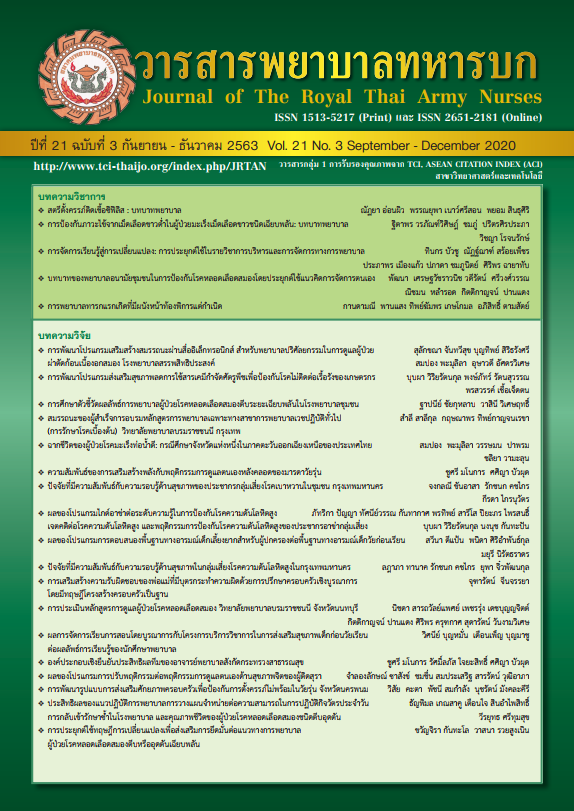Development of Health Promotion Program to Reduce the use of Pesticides for Non-Communicable Diseases Prevention of Farmers
Keywords:
health promotion program development, reduce the use of pesticides, non-communicable diseases, farmersAbstract
The purposes of this research were to develop a health promotion program to reduce the use of pesticides in order to prevent non-communicable diseases in farmers and to study the effectiveness of the program. The sample comprised of 40 registered farmers from Mae -Chan, Chiang-Rai. The research methodology was divided into 2 phases. Phase1: Develop health promotion program to reduce the use of pesticides for the prevention of non-communicable diseases in farmers. Phase 2: Pre and Post evaluation of participation in health promotion program to reduce the use of pesticides for the prevention of noncommunicable diseases in farmers. The instrument used in the research was the questionnaire to assess ฅfarmers’ knowledge on pesticide use to prevent non-communicable diseases. The data were analyzed by descriptive statistics, and Paired t-test. The results showed that the behavioral scores for pesticide use before and after receiving the health promotion program was significantly different. (t = 14.866, p <.05).
Downloads
References
Ibitayo, O. Reducing agricultural pesticide poisoning in sub-Sahara Africa: Beyond zero-risk. J. Anal. Toxicol. 2016; 6(5).
Wanwimolruk, Wanwimolruk, S., Duangsuwan, W., Phopin, K., & Boonpangrak, S. Food safety in Thailand 5: The effect of washing pesticide residues found in cabbages and tomatoes. J. Consum. Prot. Food. Saf. 2017;12(3): 209-221.
Waijittragum, P. (2016). Design trends of Thai halal products packaging for Muslim country: Indonesian food products. J. Econ. Bus. Manag. 2016;4(1),47-52. (in Thai)
Hanklang S, Kaewboonchoo O, Morioka I, Suwan-ampai P. Gender differences in depression symptoms among rice farmers in Thailand. Asia. Pac. J. Public Health. 2016;28(1): 83-93. (in Thai)
Pidgunpai K, Keithmaleesatti S, Siriwong W. Knowledge, attitude and practice associated with cholinesterase level in blood among rice farmers in Chainart Province, Thailand. J. Health Sci. 2014; 28(2): 93-99. (in Thai)
Mohiuddin, H., Siddiqi, R., & Aijaz, P. Pesticide poisoning in Pakistan: The need for public healthreforms.BMCPublicHealth.2016;141,185.
Karasali, H., & Maragou, N. Pesticides and herbicides: Types of pesticide. Encyclopedia of Food and Health. 2016; 319-325.
Lekei, E., Ngowi, A. V., Kapeleka, J., & London, L. Acute pesticide poisoning amongst adolescent girls and women in northern Tanzania. BMC Public Health. 2020; 20(1): 2-8.
Meyer, A., Parks, C., & Sandler, D. Pesticide exposure and risk of rheumatoid arthritis among licensed male pesticide applicators in the agricultural health study. ISEE Conference Abstracts. 2016; (1): 1-7.
Samsuddin, N., Rampal, K. G., Ismail, N. H., Abdullah, N. Z., & Nasreen, H. E. (2016). Pesticide exposure and cardiovascular hemodynamic parameters among male workers involved in mosquito control in East Coast of Malaysia. American Journal of Hypertension, 29(2): 226-233.
Office of Permanent Secretary. Bureau of Policy and Strategy. Thailand healthy lifestyle strategic plan, 2011-2020. Bangkok: Printing Office of National Buddhism; 2011. (in Thai)
Apidachkual T, Wongnuch P, Sittisarn S, Ruanjai T. Health situation of Akha Hill Tribe in Chiang Rai Province, Thailand. Journal of Public Health and Development. 2016;14(1): 77-97.
Apidechkul, T. Prevalence and factors associated with type 2 diabetes mellitus and hypertension among the hill Tribe elderly populations in northern Thailand. BMC Public Health. 2018;18(1): 6-16.
Kaewboonchoo O, Kongtip P, Woskie S. Occupational health and safety for agricultural workers in Thailand: Gaps and Recommendations, with a focus on pesticide use. New Solut. 2015; 25(1): 102-20
Cohen JM, Uphoff NT. Participation’s place in rural development: seeking clarity through specificity. World development. 1980; 8(3): 213-35.
Tritipsombut J, Gabklang P, Boonkerd S, Oapsuwan A. The study of knowledge, attitudes and pesticide usage behaviors among the agricultural workers at Huay Sam Kha Village, Tub Ruang SubDistrict, Phra Thong Kum District, Nakhon Ratchasima Province. SMJ. 2014; 29: 429-34.
Wilaiwan W, Siriwong W. Assessment of health effects related to organophosphate pesticides exposure using blood cholinesterase activity as a biomarker in agricultural area at Nakhon Nayok Province, Thailand. J Health Res. 2014; 28(1): 23-30. (In Thai)
Tachavijitjaru C. Health literacy: a key indicator towards good health behavior and health outcomes. Journal of The Royal Thai Army Nurses. 2018;
(Supplement) :1-11. (in Thai) 19. Rosenstock IM, Strecher VJ, Becker MH. The health belief model and preventive health behavior. Health Education Monographs 1974; 2(4): 354-86.
Downloads
Published
How to Cite
Issue
Section
License
บทความหรือข้อคิดเห็นใดใดที่ปรากฏในวารสารพยาบาลทหารบกเป็นวรรณกรรมของผู้เขียน ซึ่งบรรณาธิการหรือสมาคมพยาบาลทหารบก ไม่จำเป็นต้องเห็นด้วย
บทความที่ได้รับการตีพิมพ์เป็นลิขสิทธิ์ของวารสารพยาบาลทหารบก
The ideas and opinions expressed in the Journal of The Royal Thai Army Nurses are those of the authors and not necessarily those
of the editor or Royal Thai Army Nurses Association.






